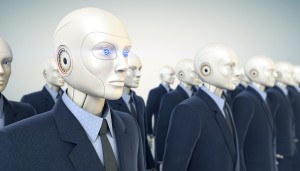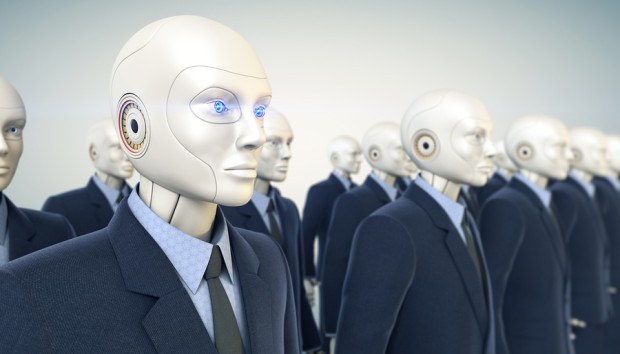Approximately 32 percent of existing UK jobs in financial services and insurance could be automated by robotics and artificial intelligence (AI) over the next 15 years, according to a new study by PricewaterhouseCoopers.
 And other industries are even more at risk. For example, 56 percent of existing transportation and storage jobs could be at risk from automation by 2030, while 46 percent of current manufacturing jobs and 44 percent of wholesale and retail jobs are headed for automation, PwC revealed in its latest UK Economic Outlook report.
And other industries are even more at risk. For example, 56 percent of existing transportation and storage jobs could be at risk from automation by 2030, while 46 percent of current manufacturing jobs and 44 percent of wholesale and retail jobs are headed for automation, PwC revealed in its latest UK Economic Outlook report.
Conversely, the threat of automation is lower in other sectors such as education (9 percent) and health and social work (17 percent), PwC said.
Overall, up to 30 percent of existing UK jobs could be automated by 2030, which is a lower proportion than those at risk in the U.S. (38 percent) and Germany (35 percent) but more than Japan (21 percent), the study added.
No industry is entirely immune from future advances in robotics and AI, said John Hawksworth, chief economist at PwC, in comments accompanying the study.
The Good News
But there is some good news: New AI-related technologies will create some new jobs in the digital technology area and, through productivity gains, will generate additional jobs elsewhere in the economy, “primarily in services sectors that are less easy to automate,” it continued.
“The net long-term impact of automation on total UK employment could therefore be either positive or negative,” the PwC report noted.
“While automation related to AI and robotics should boost productivity…, it could also widen income inequality because a greater proportion of the economic pie will go to those with the knowledge and skills needed to thrive in an ever more digital economy,” the study continued.
As a result, there is a strong case for increased investment in lifelong vocational education and training to help employees adapt to changes in automation.
“Automating more manual and repetitive tasks will eliminate some existing jobs but could also enable some workers to focus on higher-value, more rewarding and creative work, removing the monotony from our day jobs,” Hawksworth continued.
“By boosting productivity—a key UK weakness over the past decade—and so generating wealth, advances in robotics and AI should also create additional jobs in less automatable parts of the economy as this extra wealth is spent or invested,” he said.
“Levels of automation will depend on the relative cost and productivity of robots compared to human workers in carrying out different types of tasks. We expect this balance to shift in favor of robots over time, but there should still be many areas where humans retain a comparative advantage,” Hawksworth concluded.
Source: PricewaterhouseCoopers





















 10 Do’s and Don’ts of a Smart ORSA Report
10 Do’s and Don’ts of a Smart ORSA Report  Why Claims AI Build vs. Buy Decisions So Often Miss the Mark
Why Claims AI Build vs. Buy Decisions So Often Miss the Mark  AI Claim Assistant Now Taking Auto Damage Claims Calls at Travelers
AI Claim Assistant Now Taking Auto Damage Claims Calls at Travelers  New Texas Law Requires Insurers Provide Reason for Declining or Canceling Policies
New Texas Law Requires Insurers Provide Reason for Declining or Canceling Policies 

